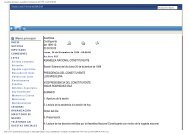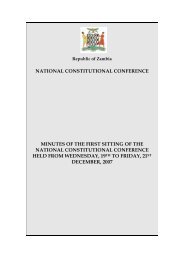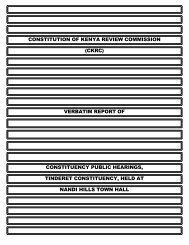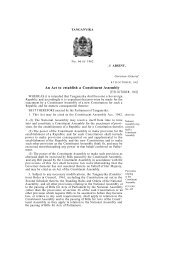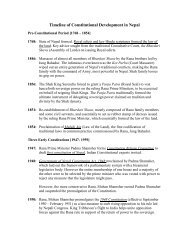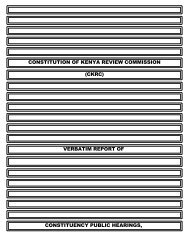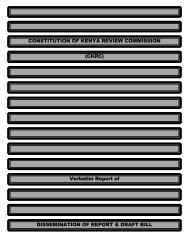constitution of kenya review commission ckrc ... - ConstitutionNet
constitution of kenya review commission ckrc ... - ConstitutionNet
constitution of kenya review commission ckrc ... - ConstitutionNet
Create successful ePaper yourself
Turn your PDF publications into a flip-book with our unique Google optimized e-Paper software.
James Njogu: Thank you, I am James Ngugi Njogu, and the following are some <strong>of</strong> the recommendations, that I would like<br />
to suggest to this <strong>commission</strong>.<br />
No. one concerns the fundamental rights and freedom <strong>of</strong> an individual. The new Constitution should provide a visible and a<br />
system <strong>of</strong> govenment that will have all the mandate to protect the citizens from any form <strong>of</strong> oppression or harassment, by any<br />
person or any group <strong>of</strong> persons. It should also enhance the faith <strong>of</strong> the citizens, through well protracted government systems<br />
that will make it clear for every citizen, to enjoy a harmonious stay in this country.<br />
The Constitution should enhance tight security, both internally and externally. Also the new constituion should allow for a clearly<br />
seen system <strong>of</strong> government that equalizes all persons, and/ or individuals, without recourse to any form <strong>of</strong> background that they<br />
carry along side themselves.<br />
Point No. 2. The law making system, the new Constitution as per my suggestions, should provide for a law making system in<br />
which:<br />
A bill should pass the ordinary five stages. Discussions to be held by the whole house, ie the Parliament. This is the discussion<br />
pertaining to the Bill. The President’s assent should not be the dertermining factor, as pertains to whether or not the Bill will<br />
become a law. In this my suggestion is in a two way category.<br />
1. The bill should be made into a law through a majority Parliament representation. That is through voting. As per my<br />
suggestion, 2/3 <strong>of</strong> the Parliament’s population representation would do best. In this case, the rights <strong>of</strong> the President would<br />
be seen as been equal to those <strong>of</strong> other members <strong>of</strong> Parliament. That is, the President will also be required to vote just like<br />
the other MPs.<br />
2. In category two, the Constitution should provide for the President assent to be just an affirmation <strong>of</strong> what has been<br />
discussed and passed in the house; and not to be his very personal opinion. In other words, the President’s assent should<br />
appear as a signature in a matter that has been discussed through the normal five stages, and have been passed from a bill to<br />
a law.<br />
3. The doctrine <strong>of</strong> separation <strong>of</strong> powers The Constitution should provide for a system <strong>of</strong> government that clearly adheres to<br />
the doctrine <strong>of</strong> separation <strong>of</strong> powers. That is the three arms <strong>of</strong> the government Legislature, executive and Judiciary, should<br />
be independent <strong>of</strong> each other. With the legislature, being the top in power, that is the legislature should ensure that the<br />
Judiciary is free from duress less coersion or undue influence, and the executive is not in any way over exercising its rights<br />
and prerogatives. Thank you.<br />
Com. Wambua: Asante sansa Bwana Njogu. Tumuite Charles K. Kimani.<br />
67




